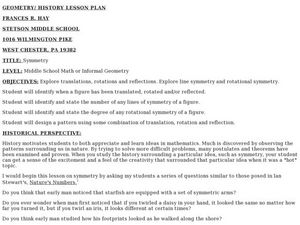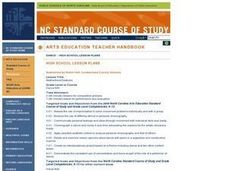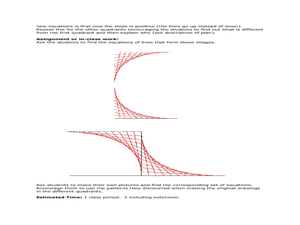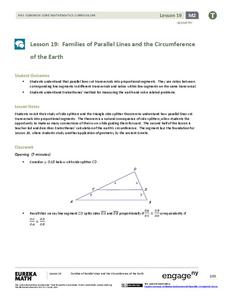Curated OER
Writing in Math Class
Students brainstorm and discuss ways math is all around them, explain in writing how they solve math problems, describe mathematical ideas in writing, and create original story problems.
Curated OER
Stories of Hope: Dragonfly and Mosquito
Students identify and interpret the value of the dragonfly as a predator of the mosquito. They create their own folktales using the dragonfly or a creature of their choice to solve the malaria problem or another issue. Students also...
Curated OER
Geometry History Lesson
Tenth graders investigate the early history of geometry. In this geometry lesson, 10th graders investigate translations, rotations, and reflections. They also solve problems with line of symmetry and rotational symmetry while reviewing...
Curated OER
Cookie Creations
Students, in teams, create and prepare an original cookie recipe. They market their cookie by designing creative packaging and advertising. They compete with other groups in a cookie contest.
Curated OER
The Muckrakers Interdisciplinary Unit
Eighth graders complete an Interdisciplinary Unit on the Muckrakers and the Progressive Movement. Students describe life in America and how Progressive Reformers changed it. identify specific problems and propose solutions. Students...
Curated OER
Abstractions/Gestures
Students examine and display the differences between literal, and non-literal movement and abstraction using a creative project in movement. This project originates as an individual item, culminating in a small group performance.
Curated OER
The Overlooked Regular Pentagon
Tenth graders discuss the history of geometry as it relates to pentagons. In this geometry lesson, 10th graders solve problems of a pentagon inscribed inside of a circle using ratio. They review other properties for shapes of polygons...
Curated OER
Mathematics of Doodles
Students use the slope and y-intercept to graph lines. In this algebra lesson, students graph linear equations and apply it to solving real life problems.
Curated OER
Football: It's Not Just for Jocks!
Eighth graders complete a variety of football-themed activities. They develop creative writing projects with a football inspiration, research and interpret football statistics and practice football skills in P.E.
Curated OER
The 3 R's of Common Denominators (Language)
Pupils solve various word problems that deal with common denominators, and write the mathematical explanations they used to obtain the solutions.
Curated OER
Get the Turtle to the Pond
Young scholars solve problems. In this math activity, students write solutions using LOGO commands in order to help get the turtle to the pond.
Curated OER
Evaluating Expressions Using Tiles
Sixth graders are shown a variety of algebraic equations. In groups, they use tiles to represent each expression in the equations. To end the lesson, they solve story problems with one and two unknown variables. Individuals share their...
EngageNY
Law of Cosines
Build upon the Pythagorean Theorem with the Law of Cosines. The 10th part of a 16-part series introduces the Law of Cosines. Class members use the the geometric representation of the Pythagorean Theorem to develop a proof of the Law of...
EngageNY
Ratios of Fractions and Their Unit Rates 2
Remodeling projects require more than just a good design — they involve complex fractions, too. To determine whether a tiling project will fit within a given budget pupils calculate the square footage to determine the number of tiles...
Teach Engineering
Future Flights: Imagine Your Own Flying Machines!
What will flying look like in the future? The 21st lesson plan in a 22-part unit on aviation reviews the major aspects of the lesson plan. Pupils brainstorm ideas of a future flying machine.
EngageNY
Families of Parallel Lines and the Circumference of the Earth
How do you fit a tape measure around the Earth? No need if you know a little geometry! Pupils begin by extending their understanding of the Side Splitter Theorem to a transversal cut by parallel lines. Once they identify the proportional...
EngageNY
Equivalent Rational Expressions
Rational expressions are just fancy fractions! Pupils apply fractions concepts to rational expressions. They find equivalent expressions by simplifying rational expressions using factoring. They include limits to the domain of the...
EngageNY
Comparing Ratios Using Ratio Tables
Decide which concentration of mixtures is the strongest. Pupils use tables to compare ratios involved in mixtures. They use two methods to make the comparisons — by finding equivalent values within the tables or by comparing the values...
EngageNY
Comparing Irrational Numbers
Build on your classes' understanding of irrational numbers by comparing their values. The 13th lesson in the 25-part module has individuals estimate values of both perfect and non-perfect roots. They finish by graphing these numbers on a...
EngageNY
Dividing by (x – a) and (x + a)
Patterns in math emerge from seemingly random places. Learners explore the patterns for factoring the sum and differences of perfect roots. Analyzing these patterns helps young mathematicians develop the polynomial identities.
EngageNY
Percent Rate of Change
If mathematicians know the secret to compound interest, why aren't more of them rich? Young mathematicians explore compound interest with exponential functions in the twenty-seventh installment of a 35-part module. They calculate future...
EngageNY
An Area Formula for Triangles
Use a triangle area formula that works when the height is unknown. The eighth installment in a 16-part series on trigonometry revisits the trigonometric triangle area formula that previously was shown to work with the acute triangles....
EngageNY
Interpreting and Computing Division of a Fraction by a Fraction—More Models II
No more inverting and multiplying to divide fractions. Applying concepts of measurement division from the previous lesson plan, pupils consider partitive division using fraction bars and number lines. They first convert fractions to like...
EngageNY
The “WhatPower” Function
The Function That Shall Not Be Named? The eighth installment of a 35-part module uses a WhatPower function to introduce scholars to the concept of a logarithmic function without actually naming the function. Once pupils are comfortable...

























